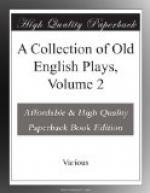A note at the end of The Lady Mother in the hand-writing of William Blagrave, acting for the Master of the Revels, shows that the play was licensed in October, 1635. From a passage in II., 1, it would seem to have been produced at the Salisbury Court Theatre in Whitefriars. In the same year Glapthorne’s comedy of the Hollander, according to the title-page, was being acted at the Cockpit, Drury Lane. His other pieces were produced rather later. I am inclined to think that The Lady Mother, in spite of the wild improbability of the plot and the poorness of much of the comic parts, is our author’s best work. In such lines as the following (IV., 1) there is a little flickering of pathos:—
“Enough, good friend;
no more.
Had a rude Scythian,
ignorant of tears,
Unless the wind enforced them
from his eyes,
Heard this relation, sure
he would have wept;
And yet I cannot. I have
lost all sense
Of pitty with my womanhood,
and now
That once essentiall Mistress
of my soule,
Warme charity, no more inflames
my brest
Then does the glowewormes
uneffectuall fire
The ha[n]d that touches it.
Good sir, desist
The agravation of your sad
report; [Weepe.
Ive to much griefe already.”
The “glowewormes uneffectuall fire” is of course pilfered from Hamlet, but it is happily introduced. There is some humour in the scene (I., 2) where the old buck, Sir Geoffrey, who is studying a compliment to his mistress while his hair is being trimmed by his servant before the glass, puts by the importunity of his scatter-brain’d nephew and the blustering captain, who vainly endeavour to bring him to the point and make him disburse. On the whole I am confident that The Lady Mother will be found less tedious than any other of Glapthorne’s pieces.
THE LADY MOTHER: A COMEDY.
BY HENRY GLAPTHORNE.
Written in 1635, and now printed for the first time.
The Play of The Lady Mother.
Actus Primus.
(SCENE 1.)
Enter Thorowgood, Bonvill & Grimes.
Bon. What? will it be a match man? Shall I kneele to thee and aske thee blessing, ha?
Tho. Pish! I begin to feare her, she does Dally with her affection: I admire itt.
Bon. Shee and her daughters
Created were for admiration only,
And did my Mistress and her sister not
Obscure their mothers luster fancy could not
Admitt a fuller bewty.
Tho. Tis easier to expresse
Where nimble winds lodge, ore investigate
An eagles passage through the agill ayre
Then to invent a paraphrase to expresse
How much true virtue is indebted to their
Unparaleld perfections.
Bon. Nay[56], but shall I not be acquainted with your designe? when we must marry, faith to save charges of two wedding dinners, lets cast so that one day may yeild us bridegroome,—I to the daughter and thou to the mother.




